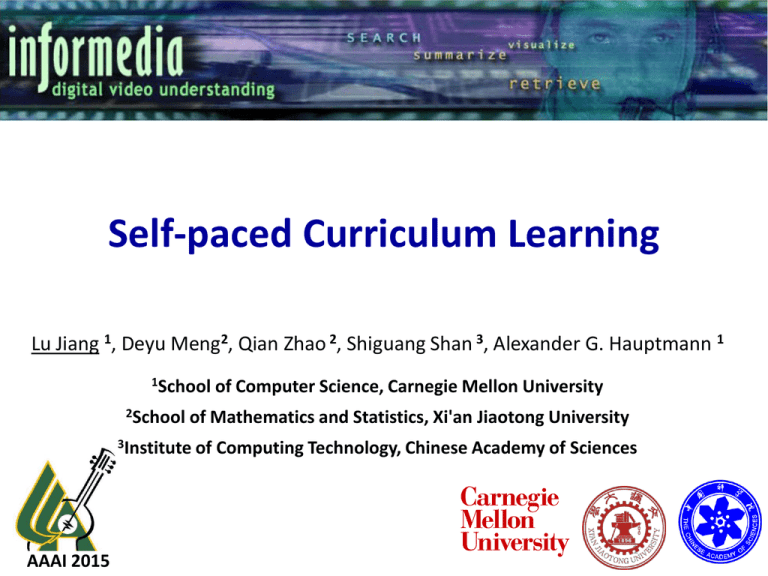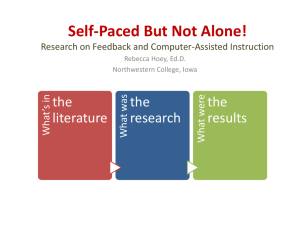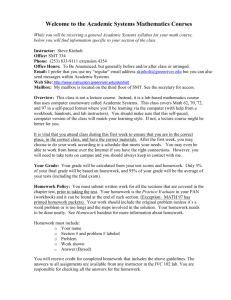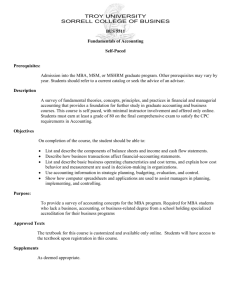Self-paced Curriculum Learning
advertisement

Self-paced Curriculum Learning Lu Jiang 1, Deyu Meng2, Qian Zhao 2, Shiguang Shan 3, Alexander G. Hauptmann 1 1School 2School of Mathematics and Statistics, Xi'an Jiaotong University 3Institute AAAI 2015 of Computer Science, Carnegie Mellon University of Computing Technology, Chinese Academy of Sciences 1 People • CMU Informedia Team Deyu Meng Qian Zhao Shiguang Shan Alexander Hauptmann Outline Motivation Background Knowledge Self-paced Curriculum Learning Experiments Conclusions 3 Motivations • Noisy • Highly unbalanced data • Training non-convex models? Many algorithms have been proposed. One solution is biologically inspired: what we will do if we are asked to learn something from the big data. 4 Curriculum Learning and Self-paced Learning • Curriculum Learning (Bengio et al. 2009) or self-paced learning (Kumar et al 2010) represents a recently proposed learning paradigm that is inspired by the learning process of humans and animals. • The samples are not learned randomly but organized in a meaningful order which illustrates from easy to gradually more complex examples. • Curriculum: a sequence of gradually learned samples. Y. Bengio, J. Louradour, R. Collobert, and J. Weston. Curriculum learning. In ICML, 2009. M. P. Kumar, B. Packer, and D. Koller. Self-paced learning for latent variable models. In NIPS, pages 1189–1197, 2010. 5 Curriculum Learning and Self-paced Learning • Samples are organized in a meaning order (curriculum). • Learning is conducted iteratively. • Models are becoming increasingly complex. Age 6 Curriculum Learning and Self-paced Learning • Samples are organized in a meaning order (curriculum). • Learning is conducted iteratively. • Models are becoming increasingly complex. “bus” samples to learn earlier “bus” samples to learn later Age 7 *The above of real examples in the TRECVID SIN dataset (http://trecvid.nist.gov/). Easy and Complex samples in Google Image Search Samples of “Dog” to learn earlier. Samples of “Dog” to learn later. In Big data, we see a lot more examples like this. 8 Outline Motivation Background Knowledge Self-paced Curriculum Learning Experiments Conclusions 9 Curriculum Learning • Curriculum Learning (CL): assign learning priorities to training samples, according to prior knowledge or heuristics about specific problems. • Teaching a robot: leverage human curriculum. Y. Bengio, J. Louradour, R. Collobert, and J. Weston. Curriculum learning. In ICML, 2009. Khan, F.; Zhu, X.; and Mutlu, B. 2011. How do humans teach: On curriculum learning and teaching dimension. In NIPS. 10 Curriculum Learning • Curriculum Learning (CL): assign learning priorities to training samples, according to prior knowledge or heuristics about specific problems. • Teaching a robot: leverage human curriculum. • Parsing in Natural Language Processing (NLP): – From shorter sentences to longer sentence. Spitkovsky, V. I.; Alshawi, H.; and Jurafsky, D. 2009. Baby 11 steps: How less is more in unsupervised dependency parsing. In NIPS Self-paced Learning • Self-paced Learning (SPL): the curriculum is determined by the learned models. • Solving a joint optimization problem of the learning objective with the curriculum (a sequence of gradually added samples). – From smaller loss to the already learned model. – to larger loss to the already learned model. M. P. Kumar, B. Packer, and D. Koller. Self-paced learning for latent variable models. In NIPS, pages 1189–1197, 2010. Jiang, L.; Meng, D.; Yu, S.-I.; Lan, Z.; Shan, S.; and Hauptmann, A. G. 2014b. Self-paced learning with diversity. In NIPS. 12 Curriculum Learning versus Self-paced Learning Curriculum Learning (CL) • Pros Self-paced Learning (SPL) • Pros – Flexible to incorporate prior knowledge/heuristics. • Cons – Learn consistent models. – Concise optimization problem. • Cons – Curriculum is determined beforehand which may not be consistent with dynamically learned modles. – Cannot use prior knowledge. – Random starting values (can be sensitive to the performance). Difficult to judge which one is better in practice. 13 Curriculum Learning versus Self-paced Learning Curriculum Learning (CL) instructor-driven Self-paced Learning (SPL) student-driven Difficult to judge which one is better in practice. 14 Self-paced Curriculum Learning Curriculum Learning (CL) Self-paced Learning (SPL) student-driven instructor-driven Self-paced Curriculum Learning (SPCL) Unified in a single framework: SPCL instructor-student-collaborative 15 Outline Motivation Background Knowledge Self-paced Curriculum Learning Experiments Conclusions 16 Self-paced Curriculum Learning • Formulated as an optimization problem (based on SPL). Consider a binary classification problem: Off-the-shell model (SVM, deep neural networks etc.) Weight vectors in self-paced learning Prior knowledge in curriculum learning 17 Self-paced Curriculum Learning How to solve (alternative search): – Fixing v and optimize model parameters w . – Fixing w and optimize weight variables v . – Increase the model age to train a more complex model. Training a model smaller loss bigger loss M. P. Kumar, B. Packer, and D. Koller. Self-paced learning for latent variable models. In NIPS, pages 1189–1197, 2010. 18 Self-paced Curriculum Learning How to solve (alternative search): – Fixing v and optimize model parameters w . – Fixing w and optimize weight variables v . – Increase the model age to train a more complex model. Recalculating the loss and select more examples. smaller loss bigger loss 19 Self-paced Curriculum Learning How to solve (alternative search): – Fixing v and optimize model parameters w . – Fixing w and optimize weight variables v . – Increase the model age to train a more complex model. Increase the model age to include more examples smaller loss bigger loss 20 Self-paced Curriculum Learning • Formulated as an optimization problem (based on SPL): 21 Self-paced Curriculum Learning • Formulated as an optimization problem (based on SPL): • Novelty: when optimizing with the fixed : – Encode heuristics/prior knowledge in the feasible region : • E.g. v1 learned before v3, v2 before v3 – Represent the regularizer to present different learning scheme. Apply different regularizer to different problems: • Start from easy to complex examples? • From easy and diverse to complex examples? • Even from complex to easy (for very smart learner/student for example)? 22 Self-paced Curriculum Learning • Formulated as an optimization problem (based on SPL): • When optimizing with the fixed : – Encode heuristics/prior knowledge in the feasible region : • E.g. v1 learned before v3, v2 before v3 – Represent the regularizer to present different learning scheme. Apply different regularizers to different problems: • Start from easy to complex examples? • From diverse to complex examples? • Even from complex to easy (for very smart learner/student for example)? 23 Outline Motivation Background Knowledge Self-paced Curriculum Learning Experiments Conclusions 24 Experiments • Matrix factorization: • Content-based video retrieval: 25 Experiments RMSE (Root Mean Square Error) Lower -> better MAP(Mean Average Precision) Higher -> better Incorporating prior knowledge into statistical learning tends to be instrumental. 26 Outline Motivation Background Knowledge Self-paced Curriculum Learning Experiments Conclusions 27 Conclusions Take home messages: – Proposed a novel learning framework that unifies the existing curriculum learning and self-paced learning paradigms. – SPCL is general and has pluggable components: • Off-the-shell model Student • Regularizers Learning schemes • Feasible region Prior knowledge – Observed benefits for the non-convex problems and the problems with noisy and unbalanced data. 28 29 Self-paced Curriculum Learning • Self-paced curriculum (SPCL) Learning unified curriculum learning (CL) and self-paced learning (SPL) into a universal framework. 30


